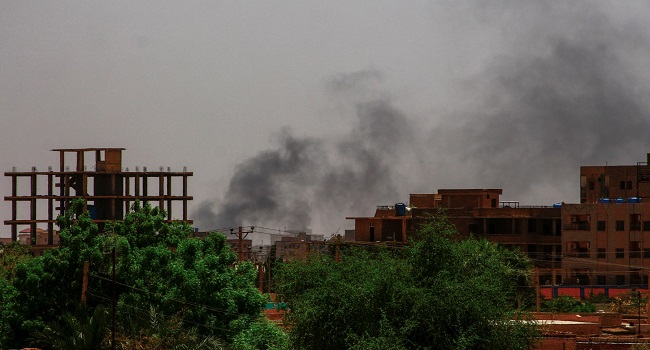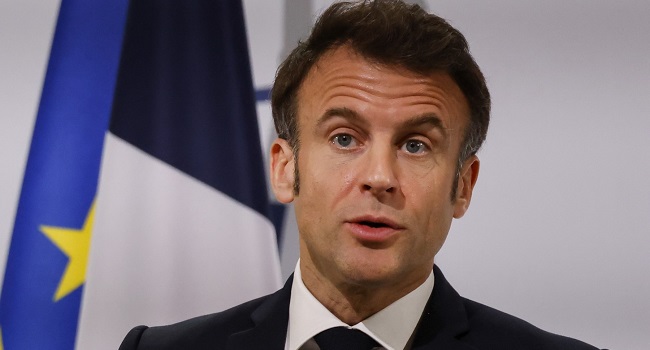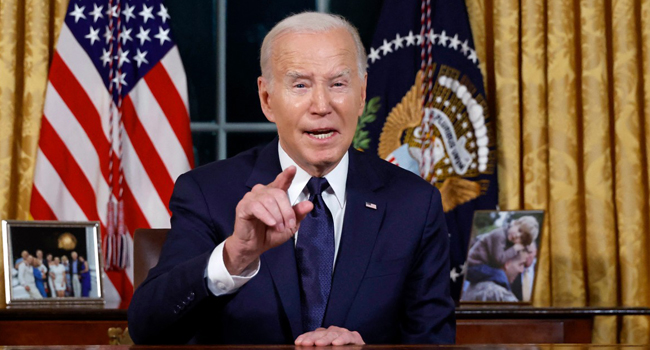Residents of Sudan’s capital again awoke to heavy clashes Sunday morning just hours after rival generals agreed to an upcoming one-week ceasefire amid ongoing talks in Saudi Arabia.
The ceasefire — the latest following many successive truces that have been systematically violated — is set to go into effect at 9:45 pm (1945 GMT) on Monday, the US and Saudi Arabia said in a joint statement.
The ceasefire “shall remain in effect for seven days and may be extended with the agreement of both parties”, the statement added after talks in Jeddah.
Multiple truces have been violated since fighting broke out five weeks ago, which the Saudi foreign ministry acknowledged in a statement published by the official Saudi Press Agency early Sunday.
READ ALSO: Sudan: Air Strikes Shake Khartoum As Rivals Agree To Ceasefire
“Unlike previous ceasefires, the Agreement reached in Jeddah was signed by the parties and will be supported by a US-Saudi and international-supported ceasefire monitoring mechanism,” it said.
But Khartoum residents — who for weeks have been sheltering from brutal urban warfare amid desperately low supplies of food and vital resources — were sceptical that this time would be any different.
“They have announced truces that they have not held to before,” said Hussein Mohammed, who remains in Khartoum North, sheltering in place with his sick mother even as their neighbourhood became deserted.
“We hope that this time mediators can monitor that the ceasefire is implemented,” he told AFP, adding that his mother has been unable to make her regular doctor’s appointments since before the conflict erupted on April 15.
The fighting pits the Sudanese army, led by General Abdel Fattah al-Burhan, against the paramilitary Rapid Support Forces, led by Burhan’s former deputy Mohamed Hamdan Daglo.
Around 1,000 people have been killed and over a million displaced throughout the weeks of intense fighting, leaving millions more with sporadic access to water, electricity or medicine.
Former allies
Along with the capital, the war-scarred western region of Darfur has seen some the worst of the fighting.
“We do not trust the warring sides,” said Adam Issa, a shop owner in El-Geneina, West Darfur. “Every time they announce a truce and they go back to fighting. We want a permanent ceasefire, not a temporary truce.”
The region is still reeling from a conflict that erupted in 2003 when former autocrat Omar al-Bashir unleashed the feared Janjaweed militia — which formed the basis for the RSF — to crush a rebellion by ethnic minority groups.
In October 2021, the warring generals collaborated to oust a civilian government, derailing a transition to democracy following Bashir’s ouster in 2019.
They installed a ruling Sovereign Council with Burhan at its head and Daglo as his deputy, but their marriage of convenience later disintegrated, and their power struggle came to blows.
Burhan officially sacked Daglo from his position on Friday, giving his title of vice president of the council to former rebel leader Malik Agar.
In a statement Saturday, Agar said he was determined to try to “end the war” and press for negotiations.
He also directly addressed Daglo — whose most recent bone of contention with Burhan was over the RSF’s integration into the regular army — saying “Sudan’s stability can only be re-established by a professional and unified army”.
Burhan and Daglo have not spoken since the war broke out, instead hurling accusations at each other through the media.
Burhan calls the RSF a “rebel militia”, claiming foreign “mercenaries” are pouring in to support Daglo, who in turn says Burhan is a “criminal” intent on reinstating the military-Islamist regime of Bashir.
Urgent need
In Khartoum, doctors have repeatedly condemned bombardments on hospitals which have come under attack by both the air force’s fighter jets and the RSF’s artillery.
Residents of densely-populated neighbourhoods have accused RSF fighters of widespread break-ins and looting, with many families returning to their homes only to find them occupied by paramilitary fighters.
Civilians and aid agencies have for weeks pleaded for both sides to secure humanitarian corridors to let in urgently needed assistance.
With most banks shuttered, access to food is becoming increasingly difficult amid crippling fuel shortages.
Warehouses and food factories have been looted, attacked and burned, raising alarm bells in what was already one of the world’s poorest countries.
Currently, 25 million people — more than half of the population — need humanitarian aid, the highest number the United Nations has ever recorded in the country.
A prolonged conflict — which analysts warn is likely — will cause millions more to become food insecure and push a million people to flee into neighbouring countries, according to the UN.
The UN’s special envoy to Sudan, Volker Perthes, on Saturday flew to New York, where he is due to brief the Security Council on Monday.
AFP




